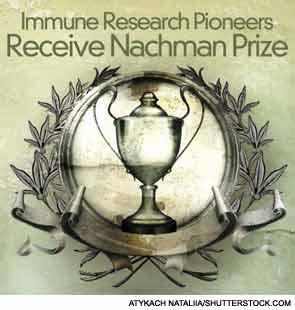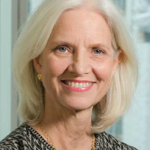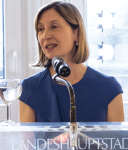
Gerd R. Burmester, MD, of Berlin, and Michael B. Brenner, MD, of Boston, are this year’s co-recipients of the Carol Nachman Prize for Rheumatology. The prize promotes clinical, therapeutic, and experimental studies in rheumatology and is the highest international honor in rheumatology research. The Carol Nachman Prize was presented to the physicians on May 3, 2013, in Wiesbaden, Germany.
Only with passion and fun you will be able to make the best discoveries and overcome the many difficult situations you will encounter in doing scientific work.
—Gerd R. Burmester, MD
RA at a Molecular Level
Dr. Burmester, professor of medicine in the department of rheumatology and clinical immunology at Charité University Hospital, Free University, and Humboldt University in Berlin, Germany, and his team were pioneers in using monoclonal antibodies in rheumatoid arthritis (RA) starting with anti-CD4 reagents and, subsequently, antibodies against cytokines such as tumor necrosis factor, interleukin (IL) 1, IL-6, and, most recently, granulocyte-macrophage colony–stimulating factor. This approach has since been used in explaining the action of kinase inhibitors.
At Rockefeller University and the Hospital for Joint Disease at Mount Sinai University, both in New York—where he had a postdoctoral fellowship after earning his medical degree from Hannover Medical School in Hannover, Germany—Dr. Burmester learned to “dig deep” into disease mechanisms investigating the activated cell systems and translating the findings into the clinic. As a medical student, rheumatology appealed to him because the field that was regarded as “strange and fruitless, however, had great potential in [my] eyes.” He says he “saw numerous patients confined to wheelchairs, many with great pain and frequent surgery to replace or repair destroyed joints,” early in his career. It is very rewarding for him to work in rheumatology with so many inflammatory disease treatment options to allow patients to live a normal life.
Now, Dr. Burmester and his team will work on early recognition of inflammatory diseases using means in molecular biology, particularly gene expression, autoantibody analysis, and novel ways of imaging. With the German Rheumatism Research Center, he will study ways to reset the disturbed immune system using autologous stem cell therapy and to address plasma cell groups, which, until now, were resistant to conventional therapy.
Dr. Burmester says he believes there is hardly any discipline in medicine that has been as successful as clinical immunology and rheumatology. His own research greatly influenced the field. “I am particularly pleased that the exciting fields of immunology and rheumatology are now in the foreground of many research efforts,” he says.
A career in research isn’t about one thing, it’s really a marathon and an opportunity to have a lifetime of investigation and contribute to advances in a field that evolves.
—Michael B. Brenner, MD
Revealing Immune System Unknowns
Dr. Brenner, Theodore B. Bayles professor of medicine at Harvard Medical School and chief of rheumatology, immunology, and allergy at Brigham and Women’s Hospital, both in Boston, dedicated his career to the discovery of a previously unknown system of immune detection in which lipids are recognized as cognate antigens by T cells. He also discovered the central importance of cadherins in regulating inflammation and pathological end-organ responses that cause joint damage in inflammatory arthritis. It “was a real privilege and honor to share the prize with Dr. Burmester,” he says, “and a lot of fun to spend time together and enjoy the experience with my co-winner this year.”



